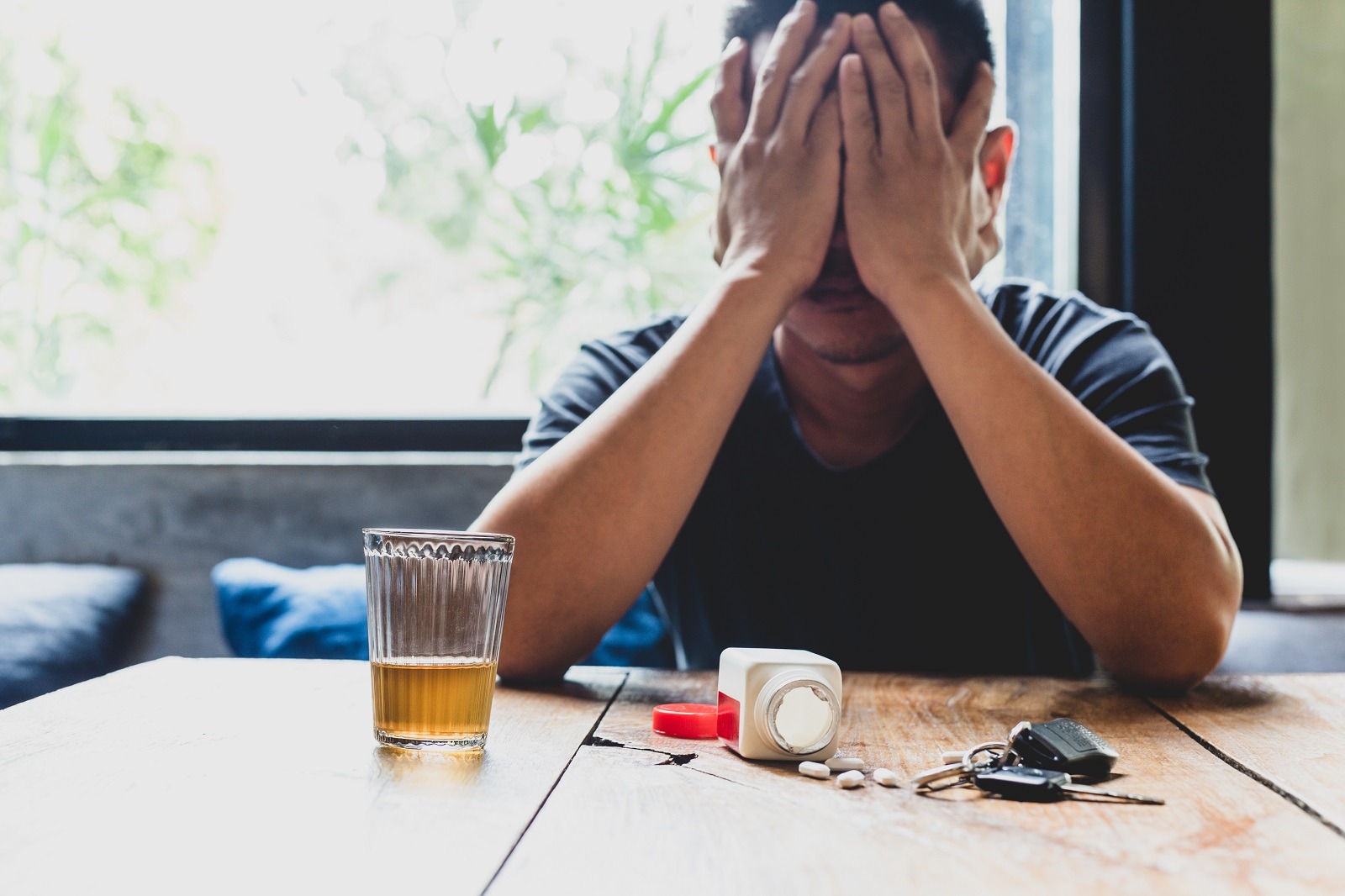Prescription Drugs | 4 min read
Can You Take Wellbutrin and Alcohol? Drug Interactions and Safety Precautions
Medically Reviewed By

On August 16, 2024
Written By
On November 19, 2021

What you will learn
- Wellbutrin is an antidepressant that’s used to treat the symptoms of major depressive disorder and other types of depression.
- Wellbutrin isn’t safe to mix with alcohol and may have serious risks, including seizures.
- It’s common for people with depression to self-medicate their symptoms using alcohol, leading to an increased risk of dependence and addiction.
- Alcohol withdrawal can be life-threatening, so it’s important not to quit alcohol suddenly to take Wellbutrin.
- If you struggle with alcohol abuse or addiction, seek help before starting Wellbutrin treatment.
Wellbutrin, the brand name for bupropion hydrochloride, is an antidepressant used to treat symptoms of major depressive disorder and other types of depression, as well as a smoking cessation aid. Like other antidepressants, Wellbutrin is not safe to mix with alcohol, especially in large quantities.
Learn more about Wellbutrin and alcohol interactions, the risks, and what safety precautions to take with this medication.
What Is Wellbutrin?
Wellbutrin is an atypical antidepressant. It works differently from other major classes of antidepressants, such as selective serotonin reuptake inhibitors and tricyclic antidepressants. Its primary action is to boost the levels of dopamine and norepinephrine in the brain to regulate mood, whereas many antidepressants work by increasing the serotonin levels in the brain.[1]
Is It Safe to Mix Wellbutrin and Alcohol?
It’s not safe to mix Wellbutrin and alcohol. On its own, alcohol acts as a depressant and impacts the brain’s communication pathway. Drinking alcohol with an antidepressant like Wellbutrin can reduce the drug’s effectiveness, inhibiting your treatment. Another effect of mixing alcohol and Wellbutrin is that the two drugs can intensify each other’s effects, leading to serious side effects.
The risks of mixing Wellbutrin and alcohol are worsened if you drink a lot of alcohol, but it’s important to note that any amount of alcohol may be unsafe. Even one or two drinks at dinner or a happy hour can cause adverse effects, including side effects.
Risks of Mixing Alcohol and Wellbutrin
Mixing any amount of alcohol with Wellbutrin can cause:
Seizures
Seizures may occur when you mix alcohol and Wellbutrin because of sudden electrical charges in the brain. Drinking alcohol while taking Wellbutrin can increase your risk of seizures, but it’s more likely if you take high doses of Wellbutrin.[2]
Worsening Side Effects
Wellbutrin can have side effects like:[3]
- Tremors
- Nausea
- Agitation
- Insomnia
- Skin rash
- Headaches
- Dizziness
- Dry mouth
- Weight loss
- Constipation
- Blurred vision
- Tinnitus
Alcohol can make some of these side effects worse, including nausea, blurred vision, dizziness, and headaches.
Reduced Effectiveness of Wellbutrin
Alcohol is a depressant, so drinking it with an antidepressant can prevent the medication from working properly.[4] You may experience depressive episodes or severe depressive symptoms like:
- Feelings of hopelessness
- Loss of interest in hobbies
- A sad or empty mood
- Feelings of guilt, worthlessness, or helplessness
- Decreased energy and fatigue
- Difficulty concentrating
- Sleep disturbances
- Thoughts of suicide
Other Side Effects
Wellbutrin can have additional side effects, including:[5]
- Suicidal thoughts or behaviors, particularly in adolescents and young adults
- Neuropsychiatric symptoms
- Hypertension or high blood pressure
- Mania or hypomania
- Psychosis
- Glaucoma
- Hypersensitivity
Alcohol Use Disorders and Depression
An addiction to alcohol is known as an alcohol use disorder (AUD). This is when you can’t stop consuming alcohol despite negative effects on your health, work, personal relationships, or other aspects of your life.[6]
AUD can develop because alcohol use creates euphoria, or a high feeling that helps people relax, relieves anxiety, or improves mood. These results are temporary, however, often causing more severe anxiety and depression once the alcohol wears off. This leads to a cycle of drinking alcohol to self-medicate depression and feel better, developing a dependence.
If you have been prescribed Wellbutrin to treat depression but feel that you can’t stop drinking alcohol, it’s important to discuss your concerns with your doctor. Mixing Wellbutrin and alcohol can be dangerous, but stopping alcohol use abruptly while having AUD can be life-threatening.
Alcohol Withdrawal and Wellbutrin
Drinking alcohol regularly builds tolerance, meaning your body gets used to it and requires more to get euphoria. Over time, your body becomes dependent on alcohol. If you stop drinking alcohol suddenly, you can experience life-threatening withdrawal symptoms like seizures, delirium tremens (DTs), coma, and possible death.
Stopping alcohol and experiencing alcohol withdrawal while taking Wellbutrin can increase these risks, including:[7]
- Seizures
- Depression
- Tremors
- Confusion
- Loss of coordination
- Dizziness
It’s crucial to be transparent with your doctor about your alcohol use habits, including the amount of alcohol you consume, the type, and any symptoms you experience. It is recommended to seek help for alcohol use disorder (AUD) before starting Wellbutrin treatment.
What to Do If You’ve Already Had a Drink
If you’re already taking Wellbutrin and had a drink, don’t panic. Though there are serious risks to combining Wellbutrin and alcohol, it doesn’t necessarily mean that you will experience severe effects.
Keep a close eye on your symptoms for 24 hours. If you experience suicidal ideation, tremors, seizures, or other troubling symptoms, seek medical attention.
How to Seek Help for Substance Misuse
Substance misuse is when you use prescription or over-the-counter drugs other ways than intended, usually to get high. For example, misusing a substance could be taking more of the drug than prescribed, taking it more frequently, or taking it to get different effects than intended – such as getting high.
No matter the drug, substance misuse can be dangerous and indicates problem use of a drug. Many substances, including generally safe prescription medications, can have serious side effects. Some have the potential for addiction as well, which is an increased risk with misuse.
Withdrawal can be uncomfortable or even life-threatening with certain substances, including alcohol. Often, the first step in getting help is entering a medical detox program. This offers a controlled setting with medical supervision to alleviate withdrawal symptoms, prevent complications, and keep you as safe and comfortable as possible during the withdrawal period.
After detox is complete, you can start an addiction treatment program on an inpatient or outpatient basis. Though the specific programs vary according to your individualized care plan, they often include individual and group counseling, behavioral therapies like cognitive behavioral therapy, and other modalities to address the emotional, social, and psychological aspects of addiction.
Get Help for Substance Misuse and Addiction
Taking Wellbutrin with alcohol can be dangerous, but stopping alcohol use suddenly if you struggle with alcohol addiction isn’t recommended. Be sure to discuss your alcohol use with your doctor before starting Wellbutrin treatment and seek help for alcohol use disorder.
Frequently Asked Questions About Wellbutrin and Alcohol Interactions
No, alcohol shouldn’t be mixed with Wellbutrin unless your doctor has specifically approved moderate alcohol consumption.
Alcohol can increase the risk of certain side effects of Wellbutrin, such as seizures, dizziness, and impaired judgment. It can also worsen the symptoms of depression and impact your Wellbutrin treatment.
Drinking alcohol with antidepressants can prevent the medication from working properly, leading to worsening depressive symptoms.
It takes about 21 hours for your body to get rid of half of a dose of Wellbutrin, which means the drug stays in the body for about 105 hours or four days. However, this can vary according to your age, body mass, any medication conditions, how long you’ve been taking the drug, and other factors. It’s important to talk to your doctor about when it’s safe to drink alcohol after stopping Wellbutrin.
If you accidentally consume alcohol while taking Wellbutrin, monitor your symptoms and pay attention to concerning symptoms like seizures or increased dizziness. Seek medical attention if you experience any concerning symptoms.
If you’re struggling with alcohol cravings while on Wellbutrin, talk to your doctor about your concerns. Alcohol use disorder can’t be overcome with willpower alone, so you may need alcohol addiction treatment to withdraw from alcohol safely, manage cravings, and learn healthier habits.
Ascendant New York Editorial Guidelines
Here at Ascendant New York, we understand the importance of having access to accurate medical information you can trust, especially when you or a loved one is suffering from addiction. Find out more on our policy.
[1] GoodRx. (n.d.). How wellbutrin works: The atypical antidepressant’s mechanism of action. GoodRx. Retrieved from https://www.goodrx.com/wellbutrin/how-it-works on 2024, July 18.
[2] Huecker, M. R. (2023, April 9). Bupropion. StatPearls [Internet]. Retrieved from https://www.ncbi.nlm.nih.gov/books/NBK470212/ on 2024, July 18.
[3] Huecker, M. R. (2023, April 9). Bupropion. StatPearls [Internet]. Retrieved from https://www.ncbi.nlm.nih.gov/books/NBK470212/ on 2024, July 18.
[4] Bupropion (wellbutrin). NAMI. (2024, April 17). Retrieved from https://www.nami.org/about-mental-illness/treatments/mental-health-medications/types-of-medication/bupropion-wellbutrin/ on 2024, July 18.
[5] National Institutes of Health. (n.d.). DailyMed – bupropion hydrochloride tablet. U.S. National Library of Medicine. Retrieved from https://dailymed.nlm.nih.gov/dailymed/drugInfo.cfm?setid=e4100232-a25d-4468-9057-af7e66205154 on 2024, July 18.
[6] U.S. Department of Health and Human Services. (n.d.). Understanding alcohol use disorder. National Institute on Alcohol Abuse and Alcoholism. Retrieved from https://www.niaaa.nih.gov/publications/brochures-and-fact-sheets/understanding-alcohol-use-disorder on 2024, July 18.





